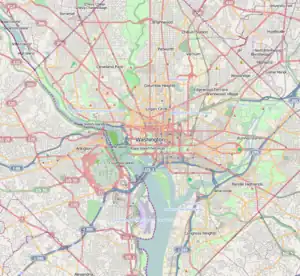| Fort DeRussy | |
|---|---|
| Part of the Civil War defenses of Washington, D.C. | |
| Rock Creek Park, Washington, D.C. | |
 Site of the fort with vegetative overgrowth | |
 Fort DeRussy  Fort DeRussy | |
| Coordinates | 38°57′47″N 77°03′04″W / 38.963056°N 77.051111°W |
| Type | Earthwork fort |
| Area | c. 65 ares (0.65 ha) |
| Site information | |
| Owner | National Park Service |
| Controlled by | Union Army (1861–1865) |
| Site history | |
| Built | 1861 |
| Built by | 4th New York Heavy Artillery Regiment |
| In use | 1861–1865 |
| Materials | Earth, timber |
| Fate |
|
| Battles/wars | American Civil War |
| Designations | NRHP contributing property |
| [1][2][3][4] | |
Fort DeRussy was an American Civil War-era fortification constructed in 1861 on a hilltop along the west bank of Rock Creek within Washington, D.C., as part of the Defenses of Washington.
History
The fort was named for Gustavus A. DeRussy, or his father, René Edward DeRussy. It was a trapezoidal earthwork with a perimeter of 190 yards, and places for 13 guns. There were also supporting rifle pits, and abatis in the Rock Creek streambed.[5]
The fort provided support during the nearby Battle of Fort Stevens (July 11–12, 1864), contributing a large amount of cannon fire in the course of that battle; the fort's 100-pounder Parrott rifle was particularly effective then, getting off 32 rounds. Today, the grounds of the fort are administered by the U.S. National Park Service as part of Rock Creek Park in the northern portion of the District of Columbia.[6]
.jpg.webp)
The fort's parapet and dry moat are in a good state of preservation, remnants of powder magazines are still visible, and lines of infantry trenches that protected the fort are still present near the fort.[6]
The site, heavily wooded, is easily reached by a trail from the west bank of the creek north of Military Road, so-called because it connected the ring of defensive installations around the capital.
External links
- Fort DeRussy Cultural Landscapes Inventory by the University of Pennsylvania Graduate Program in Historic Preservation and the Chesapeake Watershed Cooperative Ecosystem Studies Unit
- Forts around Washington, D.C. during the Civil War
References
- ↑ University of Pennsylvania Graduate Program in Historic Preservation; Chesapeake Watershed Cooperative Ecosystem Studies Unit. "Fort DeRussy Cultural Landscapes Inventory". Cultural-Landscapes.org. Retrieved November 15, 2019.
- ↑ "Fort DeRussy (historical)". Geographic Names Information System. United States Geological Survey, United States Department of the Interior. April 1, 1993. Retrieved November 15, 2019.
- ↑ "Fort DeRussy (historical)". GeoNames.org. Retrieved November 15, 2019.
- ↑ Library of Congress. Fort DeRussy (Washington, D.C.). Retrieved November 15, 2019.
{{cite book}}:|work=ignored (help) - ↑ Cooling III, Benjamin Franklin; Owen II, Walton H. (6 October 2009). Mr. Lincoln's Forts: A Guide to the Civil War Defenses of Washington. Scarecrow Press. pp. 164–172. ISBN 978-0-8108-6307-1.
- 1 2 "Civil War Defences of Washington: Fort DeRussy". U.S. National Park Service. Retrieved October 22, 2011.